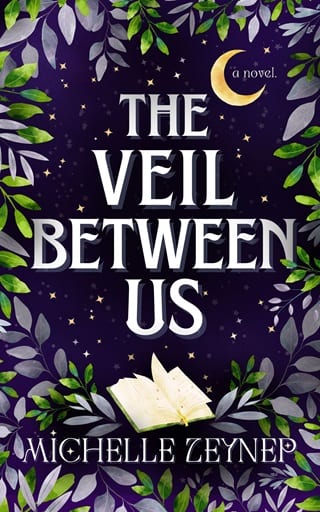2. Chapter 2
Chapter 2
M e : What do you know about Grandma’s handyman?
Caro : Nothing, just that she always complains that she has to pay for what her sons should help her with for free.
Caro : Why?
Me : Well. Would you believe that he’s… super handsome?
Caro : What?!
Caro : No way.
Caro: Grandma’s handyman is a hottie?!
Me : Yeah. Around our age. Maybe a bit older. Tall. Good hair. Pretty eyes.
Caro : Pics! Pics! Pics!
Me : No pics until you come visit Grandma Lydia. She reminds me of your neglect at least twice a day.
Caro : Booooo!
The letter looks like any other junk mail, but the bold text in the second paragraph catches my eye.
“Sell today with vanVals Realty!” the text declares. “Our cash offer for your property is $5,001,883 USD.”
“Five million dollars?” I splutter, my eyes shooting up to look at my grandma. She doesn’t stop her kitchen whirlwind for a single second as she replies, a one-woman flurry of white-chicken-chili-stirring and cornbread-doneness-testing.
“They could offer me ten. I still wouldn’t do it.”
“Is this why everyone wants you to sell? Because of offers like these?” I knew about the developers and the good rates; I just had no idea they looked like this .
Grandma Lydia shakes her head, pulling out bowls and plates, placing them in front of me so I can set them on the table.
“No. It’s the stroke. They’re worried that I’ll have another and not be able to take care of this place. The money would just ensure that I could get the level of care I need.”
I frown as I set the table. I knew they were worried about her health. I wasn’t aware they were worried about her finances. Should I feel guilty for not buying into their plans to convince her to move? “None of those dark looks, granddaughter. I have been taking care of myself for quite some time. The last thing I need is another person checking in on my heart and my blood and my brain. Besides, you’re here now.”
“But just for the summer,” I remind her, pulling spoons from the drawer.
“Mhmmm hmmm,” she agrees as she sets the cornbread onto a potholder on the table. I narrow my eyes. She and Caroline are totally in cahoots, even if it has been a while since my cousin dropped by. “Money is just a vehicle for comfort,” she says. “And I’m plenty comfortable here. Now sit. Let’s eat.”
Our conversation moves from topic to topic: her schedule for the week (mornings are fully booked, and so is Thursday afternoon, which is her weekly lunch and card game with her friends), how the morning repairs were (quick, efficient—I don’t mention how attractive her handyman is, even when she is surprised by how quickly they sent someone over), and the goals I have for our shared history project.
“A family tree,” I tell her in between bites of chili. “At the bare minimum. With photos for as many people as possible. I’d like to be as detailed as possible, with little profiles and photos of everyone.”
“Dream bigger, Rency dear. We have all summer, you know.”
“Then I would love to digitize everything. Well, as much as possible. And to write down people’s memories. Your memories.”
“About what?”
“Of…everything. Anything you can remember. About growing up. This property, the house. Anything.”
“Well, the house is an easy one. It is a 1928 Sears, and—”
“Wait!” I scramble to pull out my phone. “Is it okay if I record this? So I can write it down later?”
Grandma Lydia gestures to me, waving her hand. “By all means, go ahead.”
I fumble to pull up the recording app before setting my phone between us. “Okay, go ahead.”
“Like I was saying, the house is a 1928 Sears kit house. It was chosen out of a Sears magazine, as you know. The model is Hillrose, and it was purchased at the same time as the house just across the road.” Grandma pauses, looking up from her soup as if checking to make sure that I am still interested. I smile encouragingly. I’d heard about the Sears catalog thing before—it’s the sort of story that gets told over and over in our family—but I know that one old story can lead to another, and that’s exactly what I’m hoping for.
“Tell me more about the house,” I prompt. “About its history.”
“Well, both of the houses are the Hillrose model, and the family who was living across the street at the time actually was hired to help build this one. Their family was a jack-of-all-trades sort; one of them was a builder or a carpenter, and he came over and helped build this one. That’s why all of the cabinets look so nice—they’re custom-done. Our families have been friends for generations. Did you know that? Your grandfather was good friends with Karl, the neighbor across the way.” She smiles, a look of fond remembering on her face. “They spent a lot of time fishing, complaining about local politics. That sort of thing. Your grandfather… well, he would hate how people are fighting over Karl’s land. Ever since Karl passed away, it’s been in limbo.”
“Will his family sell it?” I ask.
A look of sadness crosses her face. “No. Well, yes, I’m sure it will eventually be sold, but no, not by the family. He didn’t have any close family left, you see. His wife passed away, and they never had children… I’m afraid he was the last of his family. I heard that when he passed away, he left no will, so no one really knows what to do with the property.” She sighs. “There is so much history in that house. It would be a shame for it to get bulldozed just for the sake of progress.”
“What sort of history?” I prod.
Grandma Lydia arches an eyebrow. “Well, here is a story for that family history of yours, although it might be too… well, too much rumor and not enough fact for a historian like yourself. It’s quite the local legend.” Grandma Lydia winks at me, and I lean forward, intrigued. “Our families were almost connected, many generations ago, through a marriage. It would have been your great-great-grandmother Florence—the same one whose ring I gave you for your eighteenth birthday. Do you still have it?”
I hook a finger into my collar and pull out the ring. It’s on a dainty gold necklace, and as it dangles there, the facets of the mine-cut diamond catch in the light. I keep it on the chain because I love it, but it only fits on my left ring finger. Despite the engraving along the interior of the band—which uses my name, Florence—it always has felt like it wasn’t right to wear it on that finger. Like it was some sort of lie. So, I keep the gold ring close to my heart instead.
“Lovely, lovely. I’m glad you still have it. Well, she was going to marry one of them with that ring exactly, but the wedding didn’t happen.”
“He left her at the altar?” I tried not to be too keen on someone else’s misfortune, but a jilted relative isn’t something I’ve ever heard about in our family.
“No, actually. Much sadder than that. Her fiancé died. Was killed, just before the ceremony.”
“Murdered?” My question comes out as a shocked whisper. Was this the man who I had read about in the article accompanying my namesake’s marriage license?
She shakes her head, eyes wide. She knows I’m hanging on her every word and she’s eating it up. “No. Well, not unless nature can murder someone. A freak storm blew in and he was hit by a bolt of lightning. It vaporized him. There one second, gone the next. Completely disappeared.”
“No way,” I tell her, tugging absently at the chain of my necklace. “That’s impossible.” I was no scientist, but that was too incredible to believe.
“Yes way. If you don’t believe me, we can wait until we dig up the article in one of those attic boxes. I know it’s there, I’ve read it myself. Or, you can go down to the historical society and they’ll pull the newspapers for you. He was there one minute and gone the next, as if he never existed at all.”
That night, I dream about the man who came to fix the house.
He’s walking into the little house in the woods, carrying a toolbox filled with chisels. His shirtsleeves are rolled up to his elbows, revealing the line of his forearms. As it is in dreams, I have the sense that it’s night, although the scene unfolds in perfect light. Reaching up under the eaves, he feels around and, producing a key, proceeds to open the door and slip inside the glow of the small house. Propelled by some unknown sense of dread, I rush to follow, but the door clicks closed behind him before I’m able to catch it.
I wake to the hum of the box fan in my window, the silent flow of the curtains rippling in its breeze. It’s still cool at night, but the fresh air is nice to fall asleep to, so I keep my window open and the fan on low. At home, there’s traffic I need to blot out with a sound machine; here, the silence is so absolute it nearly makes my ears ring. I can’t sleep without some bit of white noise, something to lull me to sleep.
In spite of the chill of early summer nights, my skin is clammy with sweat.
The urgency of the dream has followed me out here, into real life, and I’m unable to shake the ominous feel of it. Even as the sharper details of the dream dissolve around the edges of my waking memory, I can’t go back to sleep.
When I close my eyes, I hear the sound of the door smacking with dream-world finality against the door frame. The lingering feeling of building dread.
I can’t shake how real the moment felt, but I can’t believe it was anything more than a vision fed by Grandma’s stories and having a handsome man come to fix the house.
It was just a dream .
When I open my eyes, I’m gripped with the impulse to get out of bed. To look out my window, towards the forest where I know the little house sits, surrounded by densely grown trees. I haven’t seen the house in years. Even so, I know that the last time I laid eyes on it, it was old and crawled over by ivy. In my dream, there was a crispness to the house that doesn’t match any memory I have.
It was just a dream, I tell myself.
I try to sleep; I give up.
I scroll on my phone.
I make to-do lists and picture his eyes. I toss and turn. Nothing helps. When I finally decide to get up, I tell myself it’s just to go to the bathroom. I pee with the lights off, hoping to preserve any scrap of sleepiness left in me.
Instead of climbing back into bed, though, I find myself at my window. It faces north, but when I look west, I can see the outline of the dirt road, its dead-end cul-de-sac, and the little worn gravel driveway that snakes away to lead into the thick cluster of trees .
And there, out in the dark of the forest, I swear I can see a glow of light from the house in the woods.
 Fullepub
Fullepub 



